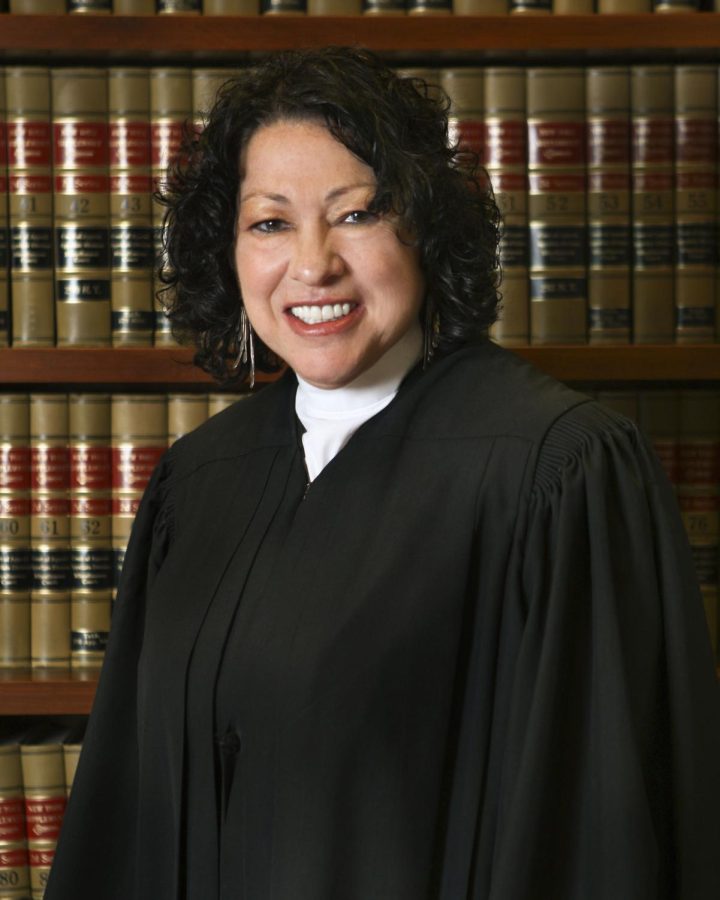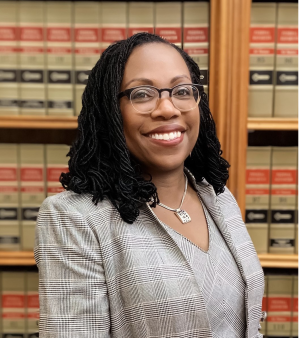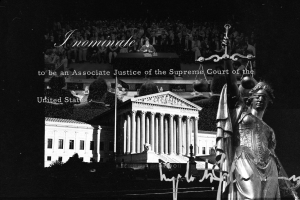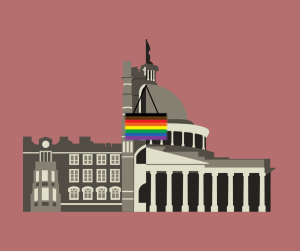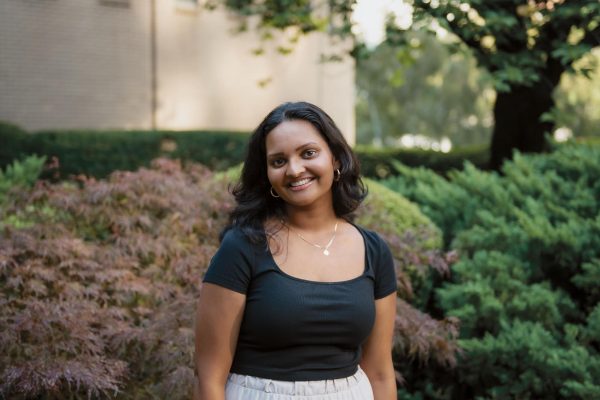SCOTUS Justice Sonia Sotomayor Speaks With Fordham Law
Tetlow moderated the conversation which covered Sotomayor’s New York roots, legal background and questions from law students
STACEY IIYSE VIA WIKIMEDIA COMMONS
The Supreme Court Justice spoke with University President Tania Tetlow, J.D., and Fordham Law School attendees about her legal experiences and advice for aspiring lawyers.
March 31, 2023
Fordham Law School hosted a discussion between University President Tania Tetlow, J.D., and Sonia Sotomayor, associate justice of the Supreme Court of the United States (SCOTUS), on March 29. The conversation featured topics such as recent dissents she has written, how her upbringing in the Bronx shaped her legal career, and her advice for young lawyers, among other subjects.
The event was hosted in Constantino Hall and began with introductions from Matthew Diller, dean of Fordham Law School, and Kimani Paul-Emile, professor of law at Fordham Law School. Tetlow moderated the talk with Sotomayor, who attended virtually, and an opportunity was allotted for law students to submit questions for the Supreme Court justice to answer.
Tetlow first asked Sotomayor how her upbringing in the Bronx shaped her outlook on the law. The Supreme Court justice explained that living her adolescent years in a diverse neighborhood exposed her to the varied ways the law impacts people of different classes and creeds.
“Certain features of the Bronx have been very important in my legal analysis of things that start with understanding how the law affects everybody.” Sonia Sotomayor, associate justice of the Supreme Court of the United States
“Certain features of the Bronx have been very important in my legal analysis of things that start with understanding how the law affects everybody,” she said.
Sotomayor explained that although she currently resides in Washington, D.C., she regularly returns to the Bronx to visit sites such as the Botanical Garden, the Bronx Zoo and Yankee Stadium. She added that many have dubbed her “Sonia from the Bronx,” a title which she said she wears “with a great deal of pride.”
The conversation then transitioned to Sotomayor’s career trajectory, from attending Princeton University as an undergraduate before matriculating to Yale Law School and serving as an assistant district attorney in New York shortly after. Tetlow asked Sotomayor about her experience working as a prosecutor and at a law firm and how those jobs shaped her outlook as a judge.
The Supreme Court justice noted that she was able to interpret the law from a variety of perspectives and angles, with criminal and civil law remaining the two most important facets of her legal work to date. She emphasized that she believes government work and private practice are at the fundamental core of what lawyers do every day.
The Supreme Court justice asserted that when drafting a dissent, there are several considerations to take into account: the purpose of it, its impact on Congress, its potential to inspire citizens to enact change, and the future.
On the topic of Sotomayor’s legal experience, Tetlow asked her how her time serving at each of the country’s three levels of the federal judiciary influenced her time on the Supreme Court. In response, Sotomayor emphasized that those three experiences were foundational in molding her into a judge who analyzes facts and how they impact people. She added that she is often criticized for being too “focused on the facts” and explained that she utilizes facts as the springboard on which rulings should be based.
Tetlow’s final question acknowledged recent dissenting opinions Sotomayor has written. The Supreme Court justice asserted that when drafting a dissent, there are several considerations to take into account: the purpose of it, its impact on Congress, its potential to inspire citizens to enact change, and the future.
According to Sotomayor, the primary goal when crafting a dissent is to evaluate the purpose of writing, to determine who the intended audience is, and to remember the argument itself. She added that the purpose of doing so is often to advocate for what the law is or should be.
Sotomayor also discussed how dissents are written with the purpose of reaching Congress, if the outcome of the case is not what she believes Congress intended for it to be.
“I’m inviting them to think about the issue and perhaps change our interpretation,” she said.
In addition to writing to state the law or disagree with the majority, Sotomayor explained that dissents are written to mobilize the public to remind them that they have the power to incite change through a majority opinion in their voting.
The justice noted that the final reason for writing a dissent involved writing for the future, in the hopes that later courts will adopt the dissent.
“I think that if you read my dissent with that in mind — that there are different audiences for each one of them — you can probably identify the audience I had in mind and who it is that I was trying to influence into thinking about this legal issue in a different way,” she said.
Following the conversation, Fordham Law students asked Sotomayor pre-approved questions. One attendee, Ashley Qamar, Fordham School of Law ’23 and president of the Latin American law students association, inquired into how the justice balanced serving as the sole representation of the Latinx community on the Supreme Court while avoiding her identity overshadowing her qualifications.
Sotomayor responded that she is a proud American with a Latina heart; however, her ethnic background is just one aspect of her.
Sotomayor responded that she is a proud American with a Latina heart; however, her ethnic background is just one aspect of her.
“You can’t take the Latina out of whoever ‘Sonia Sotomayor’ is. It’s such an integral part of my being,” she said. “I’m not just a Latina; I’m not just a Catholic; I’m not just a Yankee fan; I’m not just a former prosecutor. We all become amalgams of our experiences.”
She added that it is those experiences and identities that shape an individual’s outlook on the law and emphasized that her ultimate goal is to establish approaches and values that are in accordance with that sense of equality.
Lauren Burgess, Fordham School of Law ’23 and another attendee at the event, asked Sotomayor for advice she would have for younger generations of lawyers who are disillusioned with the American justice system.
The talk was the latest installment of the 2023 Robert E. Levine Distinguished Lecture Series, which was established by Eric P. Kane and Susan Levine in addition to other donors to honor Robert L. Levine’s legacy and offer the Fordham community access to differing perspectives regarding legal issues.
“Well, what choice do you have but to keep trying to make it right,” Sotomayor said. “You don’t want to be a bystander who lets the bus of history roll over you. You want to be that lawyer who kept working for a cause.”
She referenced the arduous journey of Dred Scott and the eventual Plessy v. Ferguson ruling, which was overturned by the Brown v. Board of Education SCOTUS case, as an example of a legion of lawyers accepting the mantle to reverse that decision.
“People make laws, justices are people, and people can make laws; wrong things can be changed, and that’s what lawyers do, is work on changing those wrong things,” Sotomayor said. “Don’t give up.”
The talk was the latest installment of the 2023 Robert E. Levine Distinguished Lecture Series, which was established by Eric P. Kane and Susan Levine in addition to other donors to honor Robert L. Levine’s legacy and offer the Fordham community access to differing perspectives regarding legal issues.
The event concluded with Tetlow thanking Sotomayor for her time and asking attendees to reflect on the event and conversation. The discussion was followed by refreshments in the lobby.

